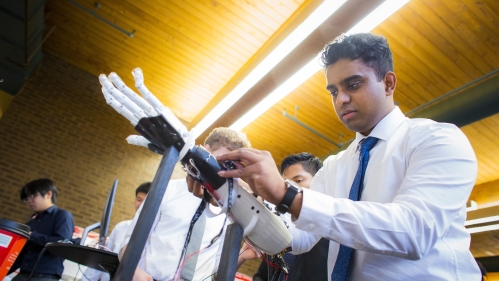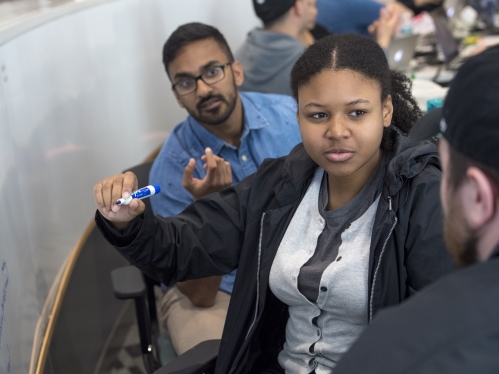
Engineering Co-op and Internship
Engineering Co-ops and Internships
School of Engineering accepts up to 6 credits from experiential based learning through their major department (ie. Mechanical Eng'g, Biomedical Eng'g, etc). There are two programs to earn credit for work experience: Internship and Co-op. Rutgers Career Services provide resources and support along with listings of internship and co-op opportunities through Rutgers Handshake. Students may also obtain positions on their own. Students would need to discuss with the Department Undergraduate Director if they want to register for credits. Once the student is registered, be sure to discuss with the advisor/dean in B100 to make sure the credits are applied correctly in Degree Navigator.
Internship
Engineering internship experiences, with the approval from the Undergraduate Directors, can be counted toward the engineering degree. Most engineering departments allow a summer internship or a part-time semester long internship to cover 3cr, usually as a technical elective. Students will register for an internship course within their major (Ex. 650:495). While on internship, the SoE recommends that students take a lighter course load. For more information on internship in major, please refer to your undergraduate handbook or contact the Undergraduate Director of your major. Note: The internship/co-op course can be counted as a Tech Elective. It's different from the Rutgers Internship/Co-op Course (RICC) offered by Rutgers CES which can only be counted as a general elective at SoE.
Co-op
Engineering students who have completed required major courses through the first semester of the junior year and have a cumulative GPA of at least 2.5 are eligible to participate in the Co-op program. The School of Engineering Co-op for 6 credits (Ex. 650:496 or 497) requires that students complete a 6-month, full-time work experience in a corporate engineering position. This usually involves a continuous summer-fall or spring-summer experience. While on co-op students may register for up to two additional courses to maintain full-time enrollment. If any course is scheduled during daytime hours (periods 1 - 5) the student must provide a letter from the company stating that release time is approved to attend class and that the student is expected to make up the time to maintain full-time status. Registering for the other 2 classes is not required, however, in the cases where the student wants to take classes while on co-op, the maximum is 2 classes. For more information, contact the Undergraduate Director of your major.
Part-time Status
If students elect to register for less than 12 credits while doing an internship or co-op, the university will consider them to be part-time students. They will pay part-time tuition and fees (pay per credit). Part- time status will affect most scholarships, need-based financial aid, and on-campus housing. If students enroll for at least six credits, they will still be eligible for loans, but most other aid will be canceled or reduced. Discuss this issue with Financial Aid. Registration for less than 12 credits may also cancel eligibility for coverage under some family health care plans. Limited health insurance can be purchased from the university for the duration of the work assignment. This should be discussed with your health insurance provider.

Course Registration
While on internship or co-op, students register for the appropriate course in their major. The student registers for 3 credits for internship or 6 credits for the co-op (no registration is required for summer). In order to participate students must provide information about the company and the position they are being hired for to the Undergraduate Director of their department, who in turn will issue a special permission number to register for the appropriate course. The Undergraduate Director will also describe requirements to receive a "pass" grade for the course, e.g. performance review by supervisor, final paper, etc (slightly different for each department), and will indicate the type of credit that will be earned, e.g. technical elective, departmental elective, general elective, etc. For more information, contact the Undergraduate Director of your major.
Working without course registration: If a student does not qualify for internship/co-op, does not want the course credit, or does not need the course credit, the student is eligible to act as a private citizen in securing a work experience, unaffiliated with Rutgers University. In these cases, the SoE does not object, however SoE also has no involvement in eligibility, participation, monitoring, or assessment of the student's work.
International Students
Curricular Practical Training (CPT) is practical work experience for F-1 students. International students who want to do CPT must follow these steps in order:
- Contact the undergraduate director in your major and provide your job information.
- If approved as a technical elective for your major, the undergraduate director will provide you with information for getting registered for the credits.
- The CPT course must be registered in the same term as the work takes place.
- CPT course registration must be for at least 1cr (0cr or 0.5cr is not acceptable).
- The student must comply with whatever the departmental requirements are for completing the course (ex. report, presentation, supervisor evaluation, etc).
- While on internship/co-op, the student must still comply with standard rules for international students, which often includes being a full-time student.
- If the work does not qualify for technical credits from the department, the student may want to apply for the RICC program offered by Rutgers Career Exploration and Success. The credits through the RICC program can be counted as general elective for engineering.
- Once registered and paid for the CPT course, the student completes the student and employer portions of the e-form, indicating the senior class dean (upperclass@soe.rutgers.edu) as the advisor/advising dean on the form.
- Once the CPT e-form is submitted, the advising dean will get notified to complete it. Once the dean completes it, the student will get an email from the CPT e-form system.


